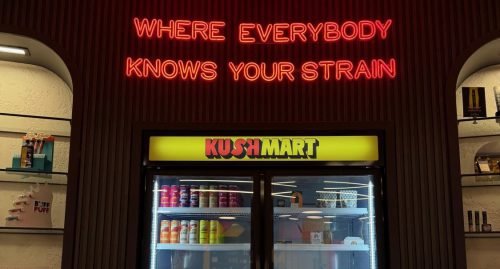Bobby Adams was stuck in Seattle rush-hour traffic while making a delivery from eastern Washington. His van, full of fresh Daddy Fat Sacks cannabis products. He calls the retailer to let them know he’s going to be late for his delivery, but he’ll be there. One problem, the order hasn’t shown up in the retailer’s inventory system yet. It’s 5:30 and the inventory specialist is leaving at 6:00. If the cannabis traceability system doesn’t register the order in time, Bobby is stuck with thousands of dollars in product.
At best, he’ll drop the product off tomorrow, but he’s out hotel money and a day of his time. At worst, the retailer cancels the late order and finds another producer to fill it on quick notice. That’s how cut-throat the cannabis business is behind the scenes. One delivery can make or break these small tier-one producers. This highlights the importance of a working cannabis traceability system, something Washington simply does not have and hasn’t had in over 15 months.
Cannabis Traceability History
Washington’s new traceability system was supposed to be operating and fully functional by Nov. 1, 2017. That was the date when MJ Freeway’s, Leaf Data Systems, was supposed to be integrated into Washington’s cannabis industry and replace BioTrack’s traceability software.
BioTrack was Washington’s original traceability provider. BioTrack’s early collaboration with Washington was vital to their growth and the development of their newest streamlined system, Patrick Vo, CEO of BioTrack, said.
The switchover from BioTrack to MJ Freeway has been a disaster. Not only was the system not fully functional by the Nov. 1 deadline, but
BioTrack Wants To Help
BioTrack had positive reviews from many people who used it before the WSLCB decided to award the newest contract to MJ Freeway. While BioTrack may have required a few more clicks per step, the software was solid and provided
BioTrack was more than helpful during this timeline of traceability chaos, extending their hand in the form of a traceability contingency-plan. This contingency-plan acted as a digital bridge between Leaf Data and the licensee’s traceability system. BioTrack is once again extending that digital hand to pull Washington’s busted traceability system out of the murky waters.
Let’s be clear, there’s been no official talks between anyone from the WSLCB or BioTrack, Vo says. But, Vo and his team understand, just like everyone else in the industry, how detrimental the current traceability problems are. Vo told me that BioTrack could resurrect the contingency system in a matter of days and get Washington’s traceability system back on track. This system is already being used by a select few hold-over licensees.
“If we can put food on the table, we’re willing to take on this project,” Vo said.
From BioTrack’s perspective, there’s no bad blood whatsoever between them and the WSLCB. But BioTrack can’t do anything until the WSLCB opens a dialogue with them; something Vo isn’t sure they can even do since they’re under contract with MJ Freeway. Realistically, the WSLCB must make sure they’re not violating contract terms with MJ Freeway or cancel the contract before they could work with BioTrack again.
Attorney General’s Office Steps In
It was recently reported that the WSLCB is working directly with the Attorney General’s office and MJ Freeway to get Leaf Data Systems back on track. A letter from the Washington AG’s office laid out specific guidelines about what the WSLCB and MJ Freeway need to do to fix Leaf Data. These guidelines include MJ Freeway hiring a third party to sweep through Leaf Data Systems for bugs and create progress reports on the possible solutions. These guidelines also include the direct cooperation of MJ Freeway CEO Jessica Billingsley in the implementation of said progress reports.
The fact that the AG’s office has to get involved to fix the traceability system is incredibly troubling. It’s troubling because a powerful third-party entity had to get involved to fix something that should have been rolled out in a functional manner over 15 months ago. For 15 months cannabis businesses have been suffering because their traceability system cannot hold up to the most basic functionality that MJ Freeway promised when they signed the contract to build Leaf Data Systems.
Hindering Small Business
Jess Brown has worked with cannabis traceability since 2015. While she believes the ‘traceability apocalypse’, that some feared never happened, has cost a lot of farms in manpower and resources. Brown works for Good Earth Cannabis and laments at the crucial manpower lost during production from double checking for Leaf Data glitches.
“Plants are disappearing and reappearing, so we have to go back and re-tag things, just double, triple, quadruple check things,” Brown explained.
These are the basic things that a state provided traceability system should handle. These are basic functions that MJ Freeway promised to provide when they signed a contract and they’re promises that simply aren’t being fulfilled. When licensees can receive fines and more severe penalties for not having plants tagged properly, it’s unacceptable for MJ Freeway’s system perpetuate that issue.
MJ Freeway’s issues didn’t just appear out of nowhere in Washington. There is a substantial trail of MJ Freeway’s business breakdowns from cyber-security breaches, lost customer data to missed deadlines and canceled contracts. As early as 2016, MJ Freeway was battling cybersecurity breaches that hindered businesses and put user data at risk, including the identity of millions of medical marijuana patients in Colorado.
MJ Freeway has had two security breaches since they took the reigns of Washington’s traceability responsibility. These breaches put vital delivery information and other client data at risk. Adams deliberately delayed deliveries during this time to avoid being robbed, just to be on the safe side. Something that cost Daddy Fat Sacks valuable time and money.
Daddy Fat Sacks recently had to liquidate their entire brand and is no longer in business. For a brand scrounging to stay in business, missed deliveries and vital hours lost editing manifests only makes their daily existence that much harder. It’s the WSCLB’s responsibility to provide a traceability system that enables businesses to succeed not hinder them and stunt entrepreneurialism.
Both the WSLCB and MJ Freeway need to shoulder the blame for this situation. The WSLCB mistakenly trusted a company with a checkered past with the backbone of the recreational cannabis industry. But, at the end of the day, MJ Freeway signed a contract and build a system that isn’t meeting obligations set from the contract. This situation isn’t fair to the licensees or the consumers. The state is still collecting 37 percent of sales in the form of excise tax and they still can’t fix the solution.
Does WSLCB Care About Washington’s Broken Cannabis Traceability?
It’s not clear exactly what the WSLCB can do to fix the traceability system but it’s a senseless problem to have. Washington has one of the oldest recreational systems in the country. It’s also one of the most mishandled and frustrating systems for those making their living within it. This mishandled situation is taking food off small business owners’ plates and it’s unacceptable.
It doesn’t look good that WSLCB renewed their contract with MJ Freeway last summer, despite their glitchy system hindering the recreational market and putting client data at risk. Moves like that make it seem like the WSLCB DOESN’T care about what’s best for Washington’s cannabis industry.
“Other states have gotten this down to a point where their system is operating largely uninterrupted,” BioTrack’s Director of Marketing, Jeffrey Gonring said. “It doesn’t have to be this way.”
FOLLOW RESPECT MY REGION ON FACEBOOK & TWITTER FOR MORE UPDATES







